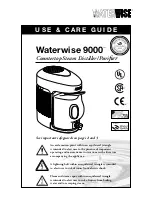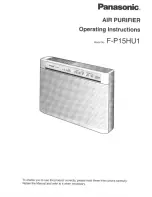
S3
S3
S2
S1
S2
S1
L N
For Power
S3
S3
S2
S1
S2
S1
For Power
I
J
J
G
F
9
6.2. Field electrical wiring
Outdoor unit power supply
~/N (single), 50 Hz, 230 V
Outdoor unit input capacity Main switch (Breaker)
*1
25 A
Wiring
Wire No. ×
size (mm
2
)
Outdoor unit power supply
3 × Min. 2.5
Indoor unit-Outdoor unit
Cylinder- or Hydrobox-Outdoor unit
*2
3 × 1.5 (Polar)
Indoor unit-Outdoor unit earth
Cylinder- or Hydrobox-Outdoor unit earth.
*2
1 × Min. 1.5
Remote controller-Indoor unit
Cylinder- or Hydrobox-side remote controller-its unit
*3
2 × 0.3 (Non-polar)
Circuit rating
Outdoor unit L-N (single)
Outdoor unit L1-N, L2-N, L3-N (3 phase)
*4
AC 230 V
Indoor unit-Outdoor unit S1-S2
Cylinder- or Hydrobox-Outdoor unit S1-S2
*4
AC 230 V
Indoor unit-Outdoor unit S2-S3
Cylinder- or Hydrobox-Outdoor unit S2-S3
*4
DC 24 V
Remote controller-Indoor unit
Cylinder- or Hydrobox-side remote controller--its unit
*4
DC 12 V
*1. A breaker with at least 3.0 mm contact separation in each poles shall be provided. Use earth leakage breaker (NV).
Make sure that the current leakage breaker is one compatible with higher harmonics.
Always use a current leakage breaker that is compatible with higher harmonics as this unit is equipped with an inverter.
The use of an inadequate breaker can cause the incorrect operation of inverter.
*2. Max. 45 m
If 2.5 mm
2
used, Max. 50 m
If 2.5 mm
2
used and S3 separated, Max. 80 m
*3. The 10 m wire is attached in the remote controller accessory.
*4. The fi gures are NOT always against the ground.
S3 terminal has DC 24 V against S2 terminal. However between S3 and S1, these terminals are NOT electrically insulated by the transformer or other device.
Notes: 1. Wiring size must comply with the applicable local and national code.
2.
Power supply cords, the Indoor-Outdoor connecting cable and the Cylinder- or Hydrobox-Outdoor connecting cable shall not be lighter than polychlo-
roprene sheathed fl exible cord. (Design 60245 IEC 57)
3. Use an earth wire which is longer than the other cords so that it will not become disconnected when tension is applied.
6. Electrical work
A-Control
Outdoor Unit
S1
S2
S3
S1
S2
S3
3 poles isolator
Power supply
Isolator
A-Control
Indoor Unit
Cylinder unit
or Hydrobox
Warning:
· In case of A-control wiring, there is high voltage potential on the S3 terminal caused by electrical circuit design that has no electrical insulation between
power line and communication signal line. Therefore, please turn off the main power supply when servicing. And do not touch the S1, S2, S3 terminals when
the power is energized. If isolator should be used between indoor unit and outdoor unit, please use 3-pole type.
6.1. Outdoor unit (Fig. 6-1, Fig. 6-2)
1
Remove the service panel.
2
Wire the cables referring to the Fig. 6-1 and the Fig. 6-2.
Fig. 6-1
A
Indoor unit
B
Outdoor unit
C
Remote controller
D
Main switch (Breaker)
E
Earth
F
Terminal block for power (L, N, ) and Indoor-Outdoor connection (S1, S2, S3)
G
Terminal block for Cylinder unit- or Hydrobox-Outdoor connection (S1, S2, S3)
H
Service panel
I
Clamp
* Clamp the cables so that they do not contact the center of the service panel or
the gas valve.
J
Earth terminal for Indoor unit and either Cylinder unit or Hydrobox
K
Cylinder unit or Hydrobox
L
Remote controller for Cylinder unit or Hydrobox
Note :
If the protective sheet for the electrical box is removed during servicing, be sure to
reinstall it.
Caution:
Be sure to install N-Line. Without N-Line, it could cause damage to unit.
F
G
H
Never splice the power cable or the indoor-outdoor, cylinder/hydro-outdoor connection cable, otherwise it may result in a smoke, a fi re or communication failure.
Fig. 6-2

































